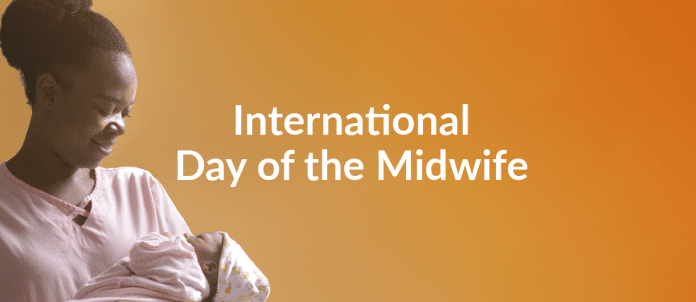Today, 5 May 2022, marks International Day of the Midwife, an important day for women, adolescents and newborns worldwide.

Midwives can meet about 90 per cent of the need for essential sexual, reproductive, maternal, newborn and adolescent health interventions. They strengthen the health and well-being of women, adolescents and newborns and put safe and effective care within the reach of more people. This contributes to women’s empowerment and gender equality.
There is a tendency to think midwives are needed just for maternal and newborn health care. However, only 55% of care needed is for maternal and newborn health interventions, whereas 37% is for other sexual and reproductive health interventions such as counselling, contraceptive services, comprehensive abortion care, and detection and management of sexually transmitted infections, and 8% is for adolescent sexual and reproductive health interventions.
Sexual and Reproductive Health Interventions
37% of care midwives provide is in sexual and reproductive health interventions. These interventions are vital to the lives of the 1.9 billion women of reproductive age worldwide because access to modern contraceptives and comprehensive abortion services are proven to protect women’s and girls’ reproductive rights and improve health outcomes. Currently, 1.1 billion women worldwide need family planning. The use of contraception advances the human right of people to determine the number and spacing of their children.
Adolescent Sexual and Reproductive Health Interventions

8% of the midwife care needed is for adolescent sexual and reproductive health interventions. An estimated 12 million girls aged 15-19 years still give birth each year, and at least 777,000 births occur to adolescent girls younger than 15 years old, mostly in Africa and Asia. Unfortunately, maternal conditions are the second leading cause of mortality among girls in this age group. Additionally, 3.9 million unsafe abortions occur among girls aged 15-19 each year which contributes to maternal mortality, morbidity and lasting health problems. In many countries access to abortions is insufficient, particularly for adolescent girls, leading to unsafe abortions and forced marriages. The role of midwives is vital to reduce mortality rates among girls and generally strengthen their health and wellbeing. An estimated 4.2 million lives could be saved annually by 2035 through quality midwifery care and midwifery support for safe, comprehensive abortion services.
State of World Population Report 2022: the bigger picture
The key role that midwives play must be seen against the backdrop of a wider global context that continues to leave women and girls vulnerable and unsupported when it comes to making informed decisions about pregnancy.

The UNFPA’s latest State of World Population Report 2022 reveals that, globally, nearly half of all pregnancies are unintended, with the total figure standing at 121 million unintended pregnancies every year or 331,000 per day on average. Such a figure points to the gaps in access to education, information and services that prevent women from making informed decisions about sexual relations, contraceptive use and reproductive health care; gaps that midwives can help to fill.
Reproductive health care begins long before pregnancy: from initial decisions about sexual relations and contraception to support with abortion services or the provision of safe delivery by skilled health personnel. Breakdowns in information, communication and support at any of these stages can have life-changing effects on women and girls. Globally, an estimated 257 million women who want to avoid pregnancy are not using safe, modern methods of contraception, and of them, 172 million women are using no method at all. The WHO estimates that 45% of all abortions around the world remain unsafe, hospitalizing about 7 million women a year in developing countries and causing between 4.7% and 13.2% of annual maternal deaths. The figures speak for themselves; unintended pregnancies amount to a global health emergency which affects the physical and mental health of millions of women and girls around the world. Midwives not only provide the sexual and reproductive health interventions but as a group who are often from the same community as their clients, can support gender empowerment and promote culturally sensitive care.





